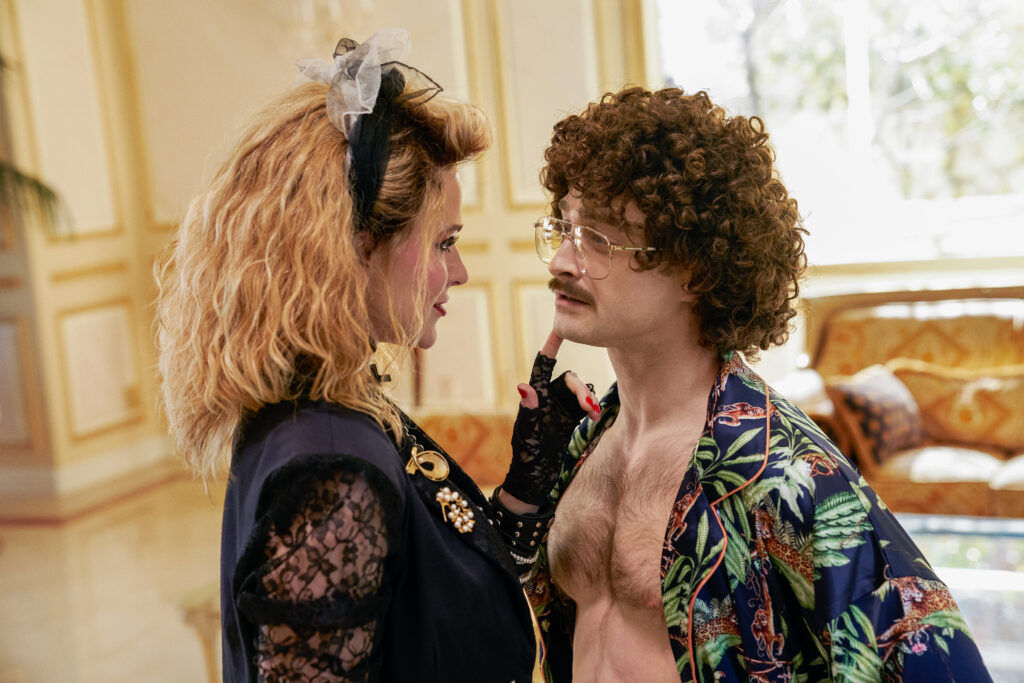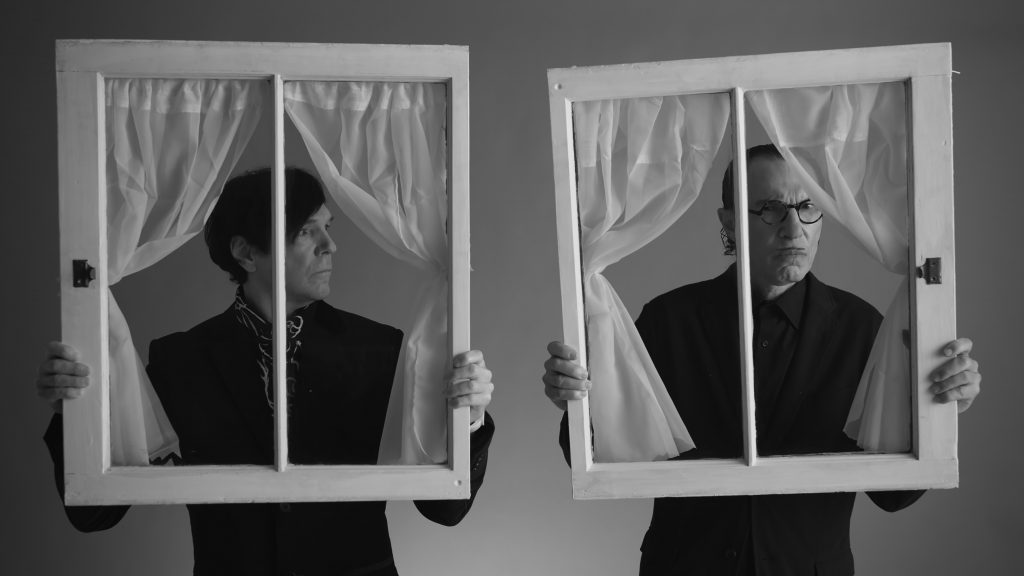November 2, 2022
by Carla Hay

“Weird: The Al Yankovic Story”
Directed by Eric Appel
Culture Representation: Taking place from the late 1960s to 1985, mostly in California, the comedy film “Weird: The Al Yankovic Story” features a predominantly white cast of characters (with some African Americans, Latinos and Asians) representing the working-class, middle-class and wealthy.
Culture Clash: Nerdy misfit Al Yankovic becomes world-famous for his parodies of pop music hits, but his fame, an inflated ego and an ill-fated romance with Madonna cause problems in his life.
Culture Audience: “Weird: The Al Yankovic Story” will appeal primarily to fans of “Weird Al” Yankovic, star Daniel Radcliffe and movies that spoof celebrity biopics.

“Weird: The Al Yankovic Story” isn’t a straightforward biopic but it’s more like a biopic parody, which is fitting, considering the movie is about music parody king “Weird Al” Yankovic. Daniel Radcliffe fully commits to an off-the-wall performance as Yankovic. Some parts of the movie get distracted by trying to be too bizarre, but this well-cast movie overall can bring plenty of laughs. “Weird: The Al Yankovic Story” had its world premiere at the 2022 Toronto International Film Festival.
Directed by Eric Appel (who co-wrote the movie’s screenplay with Yankovic), “Weird: The Al Yankovic Story” even has a parody biopic voiceover, with Diedrich Bader as an unseen and unidentified narrator saying things in a deep voice and overly serious tone. The movie has the expected childhood flashbacks, which are moderately amusing. “Weird: The Al Yankovic Story” doesn’t really pick up steam until it gets to depicting the adult Yankovic. (For the purposes of this review, the real Yankovic will be referred to by his last name, while the Al Yankovic character in the movie will be referred to as Al.)
“Weird: The Al Yankovic Story” begins in the mid-1980s, by showing the adult Al in his 20s (played by Radcliffe) being rushed into a hospital emergency room, where he is attended to by a doctor (played by Lin-Manuel Miranda). The voiceover narrator says solemnly: “Life is like a parody of your favorite song. Just when you think you know all the words … surprise! You don’t know anything.” Why is Al in a hospital emergency room? The movie circles back to this scene later, to explain why.
After this scene in the hospital emergency room, the movie flashes back to Al’s childhood with Al (played by Richard Aaron Anderson), at about 9 or 10 years old, who considered himself to be a misfit in his own household. Born in 1959, Al grew up as an only child in the Los Angeles suburb of Lynwood, California. Al’s cranky father Nick (played by Toby Huss) works in a factory, and he expects Al to also become a factory worker when Al is an adult. Al’s loving mother Mary (played by Julianne Nicholson) is somewhat supportive of Al’s artistic interests, but she lives in fear of Nick, who has a nasty temper.
Nick openly mocks Al’s dreams to be a songwriter. One day during a meal at the family’s dining room table, Al’s parents listen to Al change the words of the gospel hymn “Amazing Grace” to “Amazing Grapes.” Nick is infuriated and says that this song parody is “blasphemy.” Mary tells Al that he should stop being himself. Feeling misunderstood, Al takes comfort in listening to his favorite radio shows, including those by his idol Dr. Demento.
Something happens that changes the course of Al’s life: An accordion salesman (played by Thomas Lennon) comes knocking on the Yankovic family’s door. Nick isn’t home at the time, but Al and Mary are there. Al is immediately dazzled by the accordion for sale, which is actually not shiny and new, but rather previously owned and worn-out. Al feels an instant connection to the music that comes out of this unusual instrument.
Al begs his mother to buy the accordion for him. Mary usually goes along with whatever Nick wants. (Nick wants Al to give up any dreams of being a musician.) But this time, Mary goes against what her husband wishes, and she secretly buys the accordion for Al. However, Mary has a condition for buying this accordion: Al must hide the accordion and only play the accordion when Nick isn’t there. Al agrees to this rule and becomes a skilled accordion player.
As a teenager, Al (played by David Bloom) is considered nerdy but likeable. His outlook on life begins to change when he plays the accordion at a house party full of kids from his high school. The response he gets is enthusiastic and full of praise. It’s the first time that Al feels outside validation for his accordion playing, and it gives him the confidence to decide that he will definitely be a musician and songwriter. Things turn sour at home though, when Nick finds out about the accordion and destroys it in a fit of anger.
After graduating from high school, Al moves to Los Angeles, where he lives with three guys who are close to his age: Jim (played by Jack Lancaster), Steve (played by Spencer Treat Clark) and Bermuda (played by Tommy O’Brien), whose interests are mainly dating women and partying. Al’s roommates encourage him to pursue his dreams, even though Al is constantly being rejected when he auditions for rock bands that have no interest in having an accordion player. (The movie has some comedic montages of these rejections.)
Al’s roommates aren’t fully aware of his talent for parodies until Al does an impromptu parody of The Knack’s 1979 hit “My Sharona” and turns it into his parody song “My Balogna” when he looks at some bologna in the kitchen. The roommates are so impressed that they volunteer to be his band members and encourage Al to make a recording demo that he can send to record companies, with the hope that he can get a record deal.
Al’s demo tape finds its way to brothers Tony Scotti (played by the real Yankovic) and Ben Scotti (played by Will Forte), who own Scotti Bros. Records. Tony and younger brother Ben (who are portrayed as shallow and mean-spirited music executives) are very dismissive of Al at first and don’t think a song like “My Balogna” could be a hit. Even though “My Balogna” has been getting some local radio airplay (including be a big hit on Southern California radio’s “The Captain Buffoon Show”), Tony and his “yes man” brother Ben don’t think there’s demand on a national level for albums from an accordion-playing, parody singer/songwriter.
But then, Al meets his idol Doctor Demento (played by Rainn Wilson, in perfect casting), who thinks Al is very talented and offers to become Al’s mentor. Dr. Demento suggests that Al change his stage name to “Weird Al” Yankovic. Al gets live performance gigs, sometimes as the opening act for Dr. Demento in the early 1980s.
Al also does a recording called “I Love Rocky Road” (referring to Rocky Road ice cream), a parody of “I Love Rock’n’Roll,” a song originally recorded by The Arrows in 1976, and was made into a chart-topping hit by Joan Jett and the Blackhearts in 1981. “I Love Rocky Road” gets some airplay on local radio (including Dr. Demento’s show), and it becomes a popular song requested by audiences. Suddenly, the Scotti Brothers are interested in signing Al to their record label.
One of the best scenes in the movie is early in Al’s career, before he was famous, when he’s invited to a house party at Dr. Demento’s place. The party guests are a “who’s who” of eccentric celebrities, including Andy Warhol (played by Conan O’Brien), Alice Cooper (played by Akiva Schaffer), Salvador Dalí (played by Emo Phillips), Divine (played by Nina West), Tiny Tim (played by Demetri Martin), Gallagher (played by Paul F. Tompkins) and Pee Wee Herman (played by Jorma Taccone). Observant viewers will also notice uncredited actors portraying Elvira, Frank Zappa and Grace Jones at the party.
At this party, radio/TV personality Wolfman Jack (played by Jack Black, in a hilarious cameo) is skeptical of Al’s talent, and he tries to humiliate Al, by challenging Al to do an impromptu parody of Queen’s 1980 hit “Another One Bites the Dust.” Queen bassist John Deacon (played by David Dastmalchian), who wrote “Another One Bites the Dust,” is also at the party and wants to see how this aspiring artist will rework one of Queen’s biggest hits. Al rises to the challenge and comes up with the parody “Another One Rides the Bus,” which tells comedic tale about the frustrations of riding a bus. Al the earns the respect of Wolfman Jack, Deacon and other skeptics at the party. Other well-known comedians who make cameos in the movie include Quinta Brunson as Oprah Winfrey, Patton Oswalt as an unnamed heckler, Michael McKean as a nightclub emcee, Arturo Castro as Pablo Escobar and Seth Green as a radio DJ.
The rest of “Weird: The Al Yankovic Story” is a wild and wacky ride that shows Al’s ascent in the music business, but he succumbs to some of the pitfalls of fame. “Weird: The Al Yankovic Story” adds a lot of fiction about Yankovic’s life when the movie starts going into its more unusual tangents. For example, in real life, Yankovic had one of his biggest hits in 1984 with “Eat It,” a parody of Michael Jackson’s “Beat It.” But the movie puts a cheeky and offbeat twist on this part of Yankovic’s personal history, by making Al as the one to write the song first, and Michael Jackson “copied” the song by recording “Beat It,” without giving Al any songwriting credit.
Al’s dysfunctional romance with Madonna (played by Evan Rachel Wood) is also fabricated for the movie. (In real life, Yankovic says that he and Madonna never knew each other at all.) In the movie, Madonna and Al first meet sometime in 1983, when he’s a bigger star than she is, because she recently signed a deal to release her first album. Madonna is portrayed as an ambitious manipulator who had her sights set on Al after she found out that sales increase significantly for artists whose songs are parodied by Al.
Madonna and Al immediately begin a hot-and-heavy affair based mostly on lust. Madonna encourages Al to start abusing alcohol and acting like a difficult rock star. Al starts to alienate his bandmates/friends when he does things like show up late for rehearsals and act like an insufferable egomaniac. Madonna knows it’s easier to manipulate Al when he’s drunk, so she keeps him supplied with enough alcoholic drinks to keep him intoxicated.
It’s all part of Madonna’s plan to get Al to do a parody of one of her songs, so that her music sales can increase. (ln real life, Yankovic’s 1986 song “Like a Surgeon” was a parody of Madonna’s 1984 hit “Like a Virgin.”) But what Madonna, the Scotti Brothers and many other people didn’t expect was Al deciding that he was going to stop doing parodies and release an album of his own original songs. Al makes this decision after he accidentally takes LSD given to him by Dr. Demento, and Al has an epiphany that he has more to say to the world as a writer of his own original songs.
The movie has several moments that parody how superficial the entertainment industry can be, with the Madonna character being an obvious example of a showbiz leech. The Scotti Brothers characters are the epitome of greedy and fickle music executives who think they always know more than the artists signed to their record label. Al is portrayed as someone who enjoys his fame but also feels overwhelmed by it.
Even when with his fame and fortune, Al still craves the approval of his parents, who don’t really express that they are proud of him. At the height of Al’s success, he remained somewhat estranged from his parents. It’s a bittersweet part of the story that gives some emotional gravitas to this otherwise intentionally zany movie that doesn’t take itself too seriously. There’s a scene in the movie where Al, who has won Grammys and is a headliner of sold-out arena shows, calls his mother Mary to tell her about some of his accomplishments, but her response is the equivalent of someone saying, “That’s nice, dear,” and not being very interested.
Radcliffe (who is much shorter in height than the real Yankovic) makes up for not having a physical resemblance to Yankovic by bringing his own character interpretation of the real person. It’s not an impersonation but more like a re-imagining of what Yankovic is in this often-fabricated cinematic version of his life. Wood also turns in a memorable performance as Madonna, which might remind people more of Madonna’s chewing-gum-smacking movie character Susan from 1985’s “Desperately Seeking Susan” than the real Madonna.
“Weird: The Al Yankovic Story” doesn’t disappoint when it comes to the music. The movie has some entertaining concert scenes and gives some insight into Yankovic’s songwriting and recording experiences. If the movie has any flaws, it’s the Madonna storyline, which becomes a one-note joke and drags on for a little too long. And because the movie ends in 1985, it doesn’t include Yankovic’s post-1985 forays into starring in movies and TV shows, directing music videos for other artists, and becoming a children’s book author. However, the movie cheats a little in the timeline, because it includes Yankovic’s 1996 song “Amish Paradise,” which is a parody of Coolio’s 1995 hit “Gangsta’s Paradise.”
The last scene of “Weird: The Al Yankovic Story” might be a little too abrupt or off-putting for some viewers. But it’s an example of how this movie doesn’t want to be a conventional biopic. Yankovic’s original song “Now You Know,” which was recorded for the movie and plays during the end credits, makes a lot of meta references to the movie that are an example of this comedy film’s quirky tone. Even with all the oddball antics in the movie, “Weird: The Al Yankovic Story” succeeds in its message that good things can happen to people who aren’t afraid to be themselves.
The Roku Channel will premiere “Weird: The Al Yankovic Story” on November 4, 2022.





